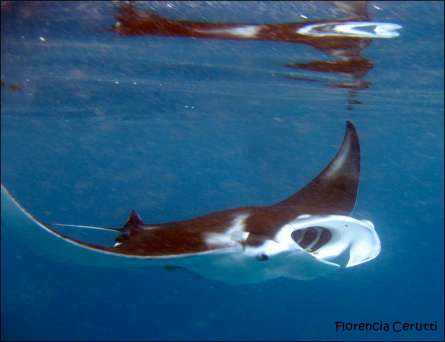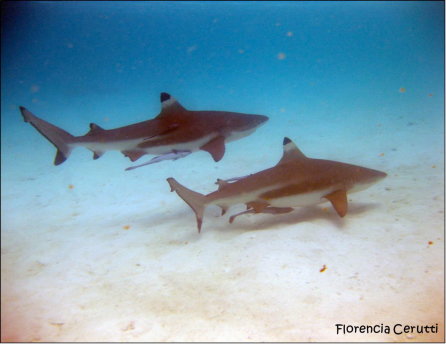Marine Life & Conservation
Indonesia’s First Shark Sanctuary

Shark and Ray conservation is high on the agenda of many scientists and is a subject written about by even more conservationists. I am getting quite a few shark conservation blogs coming through now as more people are driven to write and share their experiences and feelings. All I can say is keep them coming. It shows we care.
We are finally getting into an era where people who are not directly involved with environmental or biological sciences are getting more conscious about our planet’s endangered natural sources. However, the knowledge that actually manages to get to our societies is limited and seems to be very focused on a couple of global ‘fashion’ issues like climate change, saving the dolphins, or transgenic corn. Nothing against that, but there are so many scientific studies, so many other important topics, and so little that passes to our society that it almost seems like a waste. This narrowed-down flow of information also creates a phenomenon that is sort of known as ‘the science/society gap’ where much needed information gets lost. So now I’m writing about the science I’m involved with, not reinventing the wheel here, but instead aiming to ‘fill in some of the gap’ on the topics I love and study: marine conservation and sharks-&-rays .
Now, one of the biggest recent news for sharks & rays is the declaration of a shark sanctuary in Raja Ampat, West Papua, Indonesia (http://blog.conservation.org/2013/02/raja-ampat-launches-indonesias-first-shark-sanctuary/). This is the first shark sanctuary in Indonesia and is a major achievement of the local Papuan communities, Indonesia’s government, and NGOs (Non-government organizations) working in this area. But to understand what the problem is with sharks & rays and why this sanctuary is such an achievement, I will start by explaining what the problem is.
Black tip sharks are now protected in the Shark Sanctuary.
Besides being amazing creatures, sharks & rays are predators and have a very important role in keeping a balanced and healthy marine ecosystem. On the other hand, their populations support intensive fisheries and, therefore, human livelihoods all over the world. Sharks & rays occur in every ocean and in every ocean they are fished: from Mexico to Chile, from Japan to Australia, from UK to Cairo, from India to South Africa; everywhere. Generally, the meat is locally consumed, but the biggest trade and threat is their fins and/or gills which get exported to China to be used in traditional medicine and in traditional soup. Problem is, these animals grow very slow, they take a long time to be mature enough to reproduce, they have low numbers of pups, and they reproduce nowhere near as often as other fish that support similar intensity of fishery like tuna; their life characteristics are more similar of that of a whale or an elephant than that of a tuna or a sardine. The consequence of this is that sharks & rays cannot keep up with the intensive fishing they are subject of, nor do they have much chance to recover after been overfished.
The brighter side is that the importance of sharks & rays has been recognized in science for a while now, and it’s finally getting recognized too by the general public and government policy as noted with the recent addition of some species of sharks to the CITES list. Many countries, particularly those we called ‘developed nations’, have invested efforts in managing and conserving their populations of sharks and rays. However, many other nations are big consumers of this resource and have much less capacity for management or alternative of food sources.
Indonesia is one of the nations with the highest diversity of marine life but, sadly, it also has the largest fishery of sharks & rays in the world.
In a remote corner of Eastern Indonesia, although in the centre of the Coral Triangle (http://worldwildlife.org/places/coral-triangle), the government of a beautiful archipelago called Raja Ampat has managed to declare their waters a sanctuary where no extraction of sharks & rays should happen from now on. The local communities do not depend on this resource but are rather interested in looking after what is traditionally considered their water territories. Foreign fisheries are responsible for the shark & ray fishing in this area and they do this illegally. Moreover, the diving and marine eco-tourism industry at Raja Ampat is growing, providing an opportunity for an ‘environmentally conscious’ tourism that can appreciate this magnificent creatures alive rather than dead. The potential for sharks & rays to provide better incomes and livelihoods through tourism in this area is huge. So, I honestly think this is a great achievement and I may even venture to say that Indonesia is now one of the leaders in sharks and rays conservation!
Manta rays are also protected in the Shark Sanctuary.
However, it’s quite not the end but rather the start of sharks & rays conservation in this area. It was a long way and significant hard work was invested by many people to get this sanctuary finally declared, but there is still more work to do to implement it and monitor its success. Education, implementation, and monitoring of sharks & rays populations should now be the next steps to make this spot a real sanctuary where these amazing animals don’t go extinct and yet aid in the economic sustainability of the local communities.
So now I wonder, who’d be next nation lining up for sharks & rays protection?
Marine Life & Conservation
Double Bubble for Basking Sharks

 The Shark Trust is excited to announce that, for two more days only, all donations, large or small, will be doubled in the Big Give Green Match Fund!
The Shark Trust is excited to announce that, for two more days only, all donations, large or small, will be doubled in the Big Give Green Match Fund!
Donate to Basking in Nature: Sighting Giants
The Shark Trust is hoping to raise £10k which will be doubled to £20k. This will go towards Basking in Nature: Sighting Giants. And they need YOUR help to reach they’re goal.
The Shark Trust’s citizen science project is to monitor and assess basking sharks through sightings; encouraging data collection, community engagement, and promoting nature accessibility. This initiative aims to enhance health and wellbeing by fostering a deeper connection with British Sharks.
Campaign Aims
- Increase citizen science reporting of Basking Sharks and other shark sightings to help inform shark and ray conservation.
- Provide educational talks about the diverse range of sharks and rays in British waters and accessible identification guides!
- Create engaging and fun information panels on how to ID the amazing sharks and rays we have on our doorstep! These can be used on coastal paths around the Southwest. With activities and information on how you can make a difference for sharks and rays!
- Promote mental wellbeing through increasing time in nature and discovering the wonders beneath the waves!
Donate, and double your impact. Click Here
Marine Life & Conservation
Leading UK-based shark conservation charity, the Shark Trust, is delighted to announce tour operator Diverse Travel as a Corporate Patron

 Corporate Patrons provide a valuable boost to the work of The Shark Trust. The Trust team works globally to safeguard the future of sharks, and their close cousins, the skates and rays, engaging with a global network of scientists, policymakers, conservation professionals, businesses and supporters to further shark conservation.
Corporate Patrons provide a valuable boost to the work of The Shark Trust. The Trust team works globally to safeguard the future of sharks, and their close cousins, the skates and rays, engaging with a global network of scientists, policymakers, conservation professionals, businesses and supporters to further shark conservation.
Specialist tour operator Diverse Travel has operated since 2014 and is committed to offering its guests high quality, sustainable scuba diving holidays worldwide. Working together with the Shark Trust will enable both organisations to widen engagement and encourage divers and snorkellers to actively get involved in shark conservation.
“Sharks are truly at the heart of every diver and at Diverse Travel, we absolutely share that passion. There is nothing like seeing a shark in the wild – it’s a moment that stays with you forever!” says Holly Bredin, Sales & Marketing Manager, Diverse Travel.
“We’re delighted to celebrate our 10th year of business by becoming a Corporate Patron of the Shark Trust. This is an exciting partnership for Diverse and our guests. We will be donating on behalf of every person who books a holiday with us to contribute towards their vital shark conservation initiatives around the world. We will also be working together with the Trust to inspire divers, snorkellers and other travellers to take an active role – at home and abroad – in citizen science projects and other activities.”
Paul Cox, CEO of The Shark Trust, said:
“It’s an exciting partnership and we’re thrilled to be working with Diverse Travel to enable more divers and travellers to get involved with sharks and shark conservation. Sharks face considerable conservation challenges but, through collaboration and collective action, we can secure a brighter future for sharks and their ocean home. This new partnership takes us one more valuable step towards that goal.”
For more information about the Shark Trust visit their website here.
For more about Diverse Travel click here.
-

 News3 months ago
News3 months agoHone your underwater photography skills with Alphamarine Photography at Red Sea Diving Safari in March
-

 News3 months ago
News3 months agoCapturing Critters in Lembeh Underwater Photography Workshop 2024: Event Roundup
-

 Marine Life & Conservation Blogs2 months ago
Marine Life & Conservation Blogs2 months agoCreature Feature: Swell Sharks
-

 Blogs2 months ago
Blogs2 months agoMurex Resorts: Passport to Paradise!
-

 Blogs2 months ago
Blogs2 months agoDiver Discovering Whale Skeletons Beneath Ice Judged World’s Best Underwater Photograph
-

 Gear Reviews3 months ago
Gear Reviews3 months agoGear Review: Oceanic+ Dive Housing for iPhone
-

 Marine Life & Conservation2 months ago
Marine Life & Conservation2 months agoSave the Manatee Club launches brand new webcams at Silver Springs State Park, Florida
-

 News3 months ago
News3 months agoWorld’s Best Underwater Photographers Unveil Breathtaking Images at World Shootout 2023








